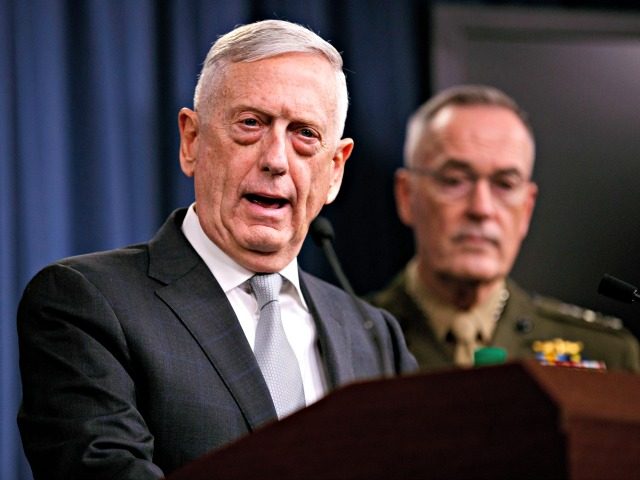WASHINGTON, DC — The Trump administration is “going to expand” American military operations against the remnants of the Islamic State (ISIS/ISIL) in Syria, Secretary of Defense Jim Mattis told lawmakers on Thursday when asked about the president’s suggestion that the United States would be pulling out of the conflict.
During a Senate Armed Services Committee hearing, Mattis told lawmakers to expect a “re-energized” effort against ISIS, stressing, “We’re not withdrawing … the French have just reinforced us in Syria with special forces here in the last two weeks.”
This week, U.S. President Donald Trump hosted a state dinner for his French counterpart, Emmanuel Macron. The two leaders reportedly discussed Syria during their meeting.
On April 15, Macron asserted that he had convinced the American commander-in-chief to stay engaged in Syria “for the long-term.”
After highlighting President Trump’s repeated comments about pulling the U.S. military out of Syria, Sen. Jeanne Shaheen (D-NH), asked the Pentagon chief, “If we withdraw our troops from Syria now would we have finished the fight against ISIS?”
Secretary Mattis responded:
Right now, senator, we’re not withdrawing. You’ll see a re-energized effort against [ISIS in] the Middle Euphrates River Valley in the days ahead and against the rest of the geographic caliphate.
You’ll see increased operations on the Iraq side of the [Syrian] border, and the French have just reinforced us in Syria with special forces here in the last two weeks. This is an ongoing fight right now.
Sen. Shaheen further pressed Mattis, asking, “So we need to stay there in order to finish the fight against ISIS?”
“We’re continuing the fight. We’re going to expand it and bring in more regional support. It’s probably the biggest shift we’re making right now,” Mattis replied.
In recent weeks, President Trump has repeatedly expressed a desire to withdraw U.S. troops from Syria, a position that reportedly caught his defense and national security team off guard.
Without providing a timeframe, President Trump doubled down on wanting the U.S. military to “get out” of Syria when briefing reporters on April 3.
“We were very successful against [the Islamic State]. We’ll be successful against anybody militarily. But sometimes it’s time to come back home, and we’re thinking about that very seriously,” the president declared.
Several U.S. Defense officials have highlighted the need to continue operations against ISIS, noting that the group remains a threat.
On Thursday, U.S. Central Command (CENTCOM) — charged with American military operations in the Middle East — acknowledged:
[ISIS] still retains the ability to carry out lethal attacks and poses a potent threat to civilians and to the stability of the region. … [The U.S.-led] coalition continues to support operations and training conducted by ISF [Iraqi Security Forces] and [Kurdish-led] SDF [Syrian Democratic Forces] as they have worked tirelessly to liberate 7.7 million people and more than 98 percent of land previously controlled by [ISIS].
These ongoing operations demonstrate the hard work that remains to ensure the lasting defeat of the terrorist, criminal organization.
The Trump administration has been pushing for a “regional ownership” of the conflict, urging Middle Eastern nations like Saudi Arabia to contribute more to the fight against ISIS right in their backyard.
Trump also told reporters on April 3:
We’ve almost completed that task [of defeating the Islamic State], and we’ll be making a determination very quickly, in coordination with others in the area, as to what we’ll do. Saudi Arabia is very interested in our decision, and I said, “Well, you know, you want us to stay, maybe you’re going to have to pay.”
On the same day, Brett McGurk, the president’s special envoy for the U.S.-led coalition against ISIS, conceded that the administration is conducting a routine review of its operations in Syria, noting that it is pushing for “regional ownership” of the conflict.

COMMENTS
Please let us know if you're having issues with commenting.